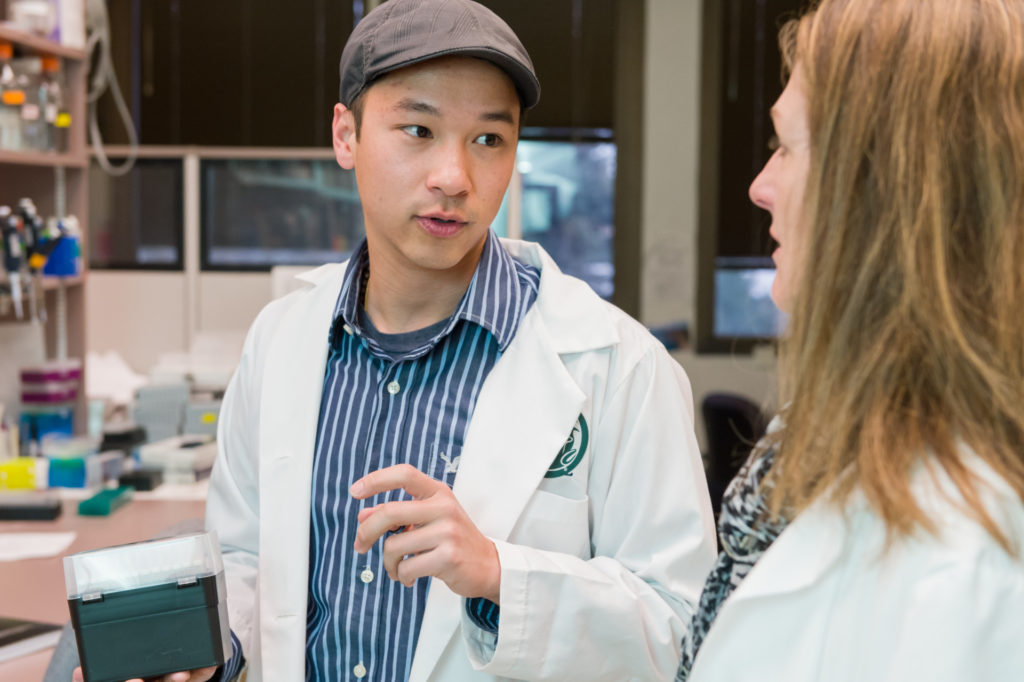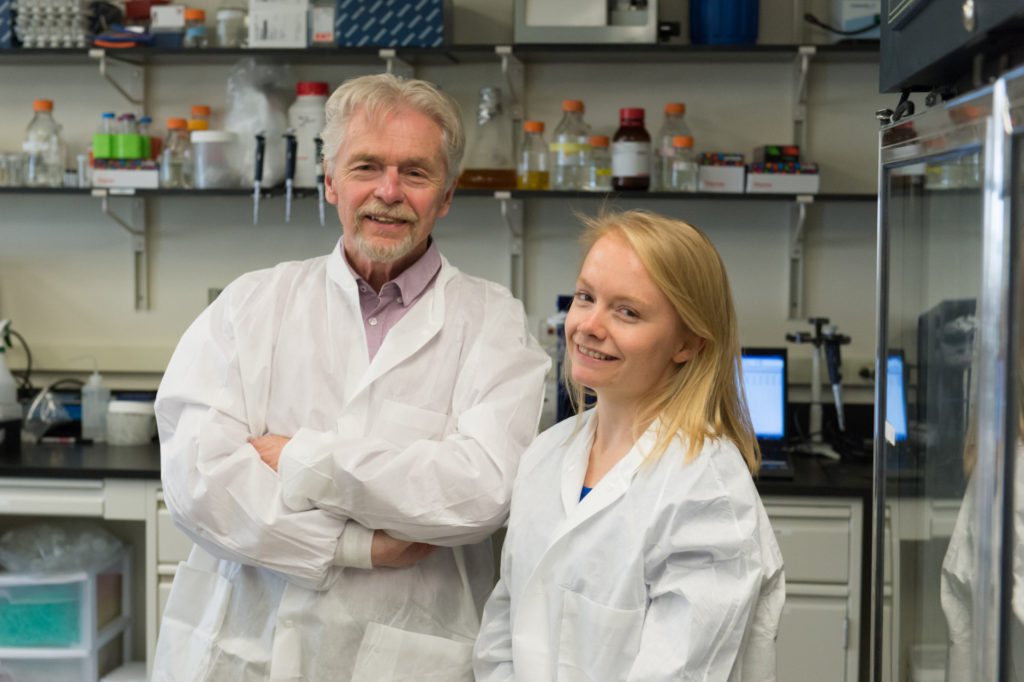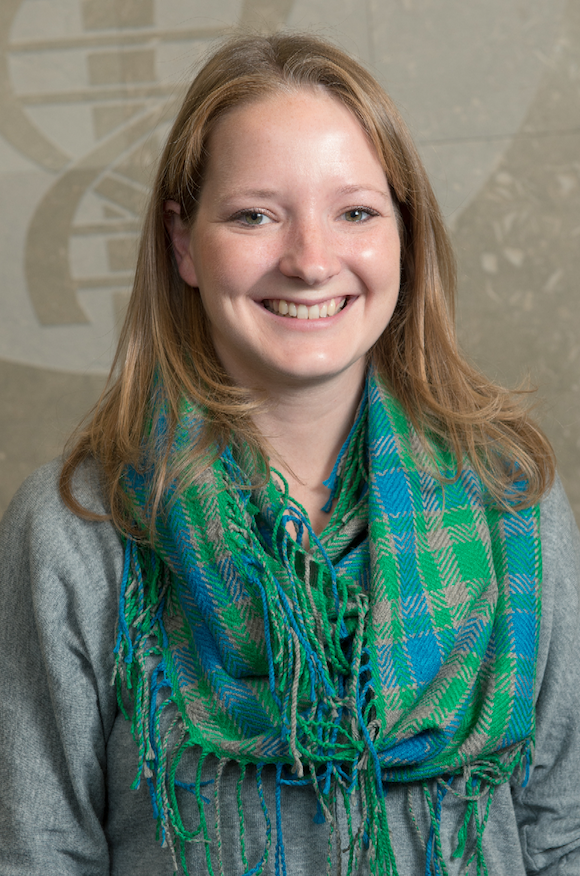
Above: Enrique Doster, a D.V.M./Ph.D. student, is the most recent program trainee to receive a prestigious national fellowship – in this case, to support his research into antimicrobial resistance in cattle production systems. Photo: Joe A. Mendoza/Colorado State University

Enrique Doster began to understand the role of veterinary medicine in public health as a kid growing up in the border town of McAllen, Texas, when he followed a close family friend and large-animal veterinarian on ranch visits back and forth between Mexico and the United States.
They called on ranches raising horses, cattle, goats, rodeo stock, and the occasional barn cat. They discussed risks of infectious diseases including bovine tuberculosis and Salmonella – risks that gained heightened attention with frequent cross-border animal shipping and the ability of these bacterial diseases to be passed among animals and people.
“The whole system of livestock production and infectious disease is the obvious next step in those discussions,” said Doster, a graduate student in epidemiology at Colorado State University. “My experiences really reinforced the systems thinking that now I can’t see with world without.”
Doster is among 15 young scientists enrolled in CSU’s combined D.V.M./Ph.D. program, which prepares veterinarians as researchers who are uniquely qualified to address global public-health challenges with biomedical investigation and veterinary clinical knowledge. The current dual-degree program was officially established in 2001.
Major support for education

Doster recently received major support for his graduate education in the form of a prestigious fellowship from the National Science Foundation that provides a significant stipend and tuition benefits. Doster is among several CSU graduate students to earn a fellowship through the NSF Louis Stokes Alliance for Minority Participation Bridge to the Doctorate.
Other students in the D.V.M./Ph.D. program likewise have earned highly competitive awards reflecting their promise as veterinary researchers and the quality of the program overall, said Dr. Susan VandeWoude, program co-director and associate dean for research in the College of Veterinary Medicine and Biomedical Sciences.
Two D.V.M./Ph.D. students, Kristen Davenport and Mia Smith, have received the prestigious F30 National Research Service Award Fellowship from the National Institutes of Health. A third student, Elliott Chiu, is likely to garner an NIH F30 fellowship this summer. These combined program fellowships provide stipends and tuition for up to four years of graduate work.
The college also holds an NIH Ruth L. Kirschstein Institutional Predoctoral Training Grant that supports D.V.M./Ph.D. graduate stipends and tuition for other students.
Davenport studies prion disease; she completed her Ph.D. this spring and now is finishing her veterinary training. Smith, who studies diabetes immunology, will receive her Ph.D. later this summer. Chiu studies interactions between viruses that have become part of host DNA and viruses transmitted from one individual to another.
“We are able to recruit the top students in the country to our program because of the caliber, diversity, and accomplishments of our current trainees,” noted VandeWoude, a professor of comparative medicine. Her laboratory, which is among those mentoring D.V.M./Ph.D. students, examines feline immunodeficiency virus in domestic and wild cats to better understand the ecology of infectious disease. Much of her work helps advance understanding of HIV-AIDS in people.
Solving a global health problem

Doster’s fellowship will support his study of bacterial communities within livestock production systems, and, ultimately, how these bacterial communities may be influenced by a wide range of management practices, including antibiotic use, feeding, waste management, and associated crop farming.
It’s a burgeoning field of study because of mounting public and policy concerns related to antimicrobial resistance – or the ability of infectious bacteria and other bugs to resist antibiotics and similar drug treatments.
Antimicrobial resistance has become a global food-safety and public-health problem that plays out, in worst-case scenarios, when hospitalized human patients infected with “superbugs” cannot be effectively treated with currently available medicine.
CSU scientists are experts on the issue and are seeking to understand whether and how livestock production has a role in antimicrobial resistance. Dr. Paul Morley, Doster’s faculty mentor, is working with colleagues to develop use of new DNA sequencing technology to trace antimicrobial genes in cattle and other food-production systems. They want to determine where infectious organisms originate and how they move through the food system and environment to people.
It’s this kind of systems-based thinking – linking human, animal, and environmental health – that most intrigues Doster and many of his peers in the D.V.M./Ph.D. program.
“I don’t want to treat a single animal or a single person. I want to put all the pieces together,” Doster said. “Ultimately, we’re interested in improving public health.”